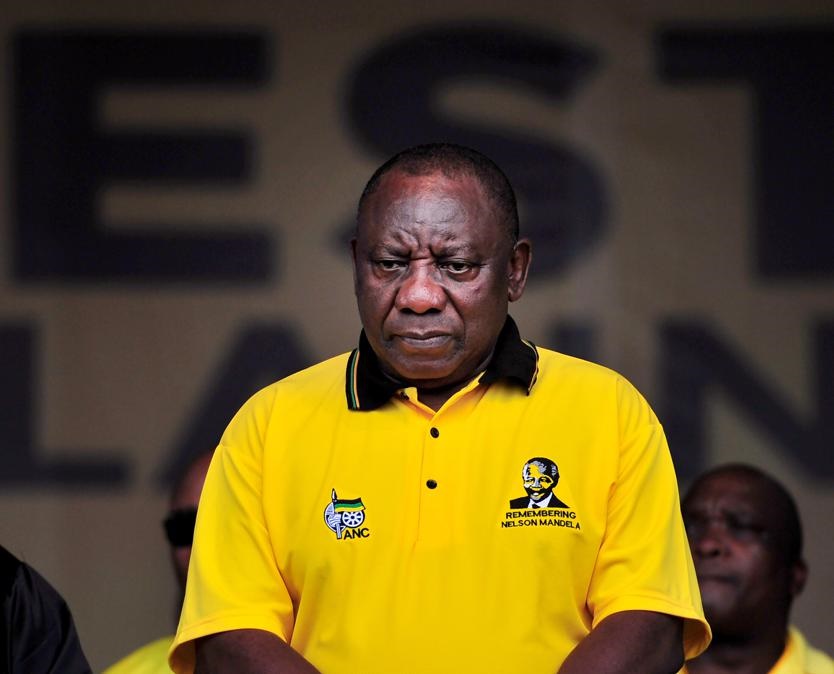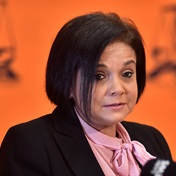
Already slammed by unions for the proposed split and potentially including IPPs, the president’s newly formed Cabinet committee dealing with the crisis has come under fire for lacking technical expertise
President Cyril Ramaphosa faces a blowback over his government’s plans to fix Eskom.
Compounding the resistance he is already receiving from alliance partners, he faces accusations by some in the ANC of bowing to the dictates of the World Bank and global superpowers, which want the involvement of independent power producers (IPPs) to be accelerated and want to see the power utility ultimately privatised.
Ramaphosa has established a Cabinet committee – led by Deputy President David Mabuza, and including Public Enterprises Minister Pravin Gordhan, Energy Minister Jeff Radebe, Transport Minister Blade Nzimande, Police Minister Bheki Cele and State Security Minister Dipuo Letsatsi-Duba – to deal with the power crisis, and he has ordered daily updates from them.
But Ramaphosa’s intervention has been criticised for appointing his ministers who lack a technical understanding of Eskom’s problems.
“Political principals are not technical, so they take what they are given from technical people,” said a national government insider. “You need the intervention to be led by someone who will understand the issues.”
Ramaphosa has already, in December last year, appointed an eight-member Eskom Sustainability Task Team – which has individuals with extensive expertise in electricity; management and economy – to advise government on actions to resolve the utility’s operational, structural and financial problems.
Doubts have also been expressed about the wisdom of including IPPs in the electricity-generation system, because their independence would allow them to pull the plug without taking into account political and social implications.
ANC secretary-general Ace Magashule warned that any proposal to privatise Eskom was misplaced because the ANC had no such policy. He said such discussions would only lead to more ructions in the tripartite alliance.
“We must stick to our conference resolutions. We must respect them, and people will take us seriously, said Magashule.
“The ANC never wronged anyone. Those who wronged people are individual leaders. Leaders are not the ANC; the ANC is an organisation. Leaders come and go. “We have reassured South Africans that Eskom will not be privatised.”
But a former senior government official, with intimate knowledge of discussions with the World Bank, said it was likely that Ramaphosa was facing pressure to privatise Eskom from institutions such as the bank.
The official said that early last year, the World Bank made a threat to government that it should sign agreements with the IPPs. If not, said the bank, it would withdraw the funds it was giving to Eskom.
“The bank’s representatives said that if, by the end of April 2018, South Africa did not sign with the IPPs, the Word Bank was pulling its support. You then need to ask yourself why the World Bank would take such a radical position,” the senior government official said.
The source said it was, therefore, likely that the new proposals on Eskom were being driven from outside the country, because the World Bank also complained that Eskom was overstaffed.
In Parliament on Thursday, Ramaphosa repeated this, saying Eskom was overstaffed by 27 500 people and that government was looking at offering them voluntary severance packages instead of retrenchments.
The senior government official said that the National Energy Regulator of SA had suggested that Eskom review its employee benefit structure as staff subsidies, including those for meals, were unsustainable.
Among the other complaints about the IPPs expressed to City Press by the senior official were that components such as solar panels were not made locally and had to be bought abroad; and that some IPPs were fully funded by parent countries such as Germany.
And, said the official, money earned from electricity sales would leave the country.
Trade unions are vehemently opposed to Ramaphosa’s proposal, announced in his recent state of the nation address, to unbundle Eskom into three separate entities – responsible for power generation, distribution and transmission.
They claim it is a step towards privatisation, retrenchments and higher power prices.
Labour federation Cosatu vowed to take drastic action, including not voting for the ANC in the general election in May.
Metalworkers’ union Numsa, an affiliate of union federation Saftu, has also expressed its opposition to any moves to privatise Eskom.
It circulated a document, which was sent by consultancy firm Rothschild to Eskom chief executive Phakamani Hadebe shortly after Ramaphosa became president last year, containing a proposal for the sale of Eskom’s assets.
The inclusion of the ministers of police and state security in the special Cabinet committee on Eskom which Ramaphosa announced last week, suggest that claims that Eskom was being used to sabotage the economy are not being taken lightly.
BLAME GAME
However, speaking to City Press on Friday, Ramaphosa changed tack, saying he had no evidence to support this, although his ANC office was the first to make the allegation.
“We are dealing with challenges as they come. Any talk of sabotage ... [and] anybody who says so, must be able to demonstrate this. We are just going through economic challenges,” he said.
Senzo Mchunu, a Ramaphosa confidante and the ANC’s head of organising, told City Press in Thohoyandou, in Limpopo, on Friday that he blamed “black managers” for the energy crisis.
“We will regret calling some of our black managers people of excellence. What has happened in most of the parastatals is that those people whom we trusted, who indeed are black managers, proved to be fake. They became excellent in failure and looting,” he said.
ANC head of presidency Zizi Kodwa, who first mentioned sabotage, listed the problems at Eskom as being: an ageing infrastructure; a lack of experienced and skilled technicians, particularly engineers; technical bankruptcy; expensive design flaws; cost overruns at new power stations Medupi and Kusile; and costly human error.
“The current business model of Eskom is not sustainable and profitable, hence a need to split it into three entities under an Eskom holding,” he said.
Despite moves to dismiss the sabotage claims, a government security insider said the timing of last week’s load shedding “cannot be understood, and there is a high likelihood that because of the unbundling, some people are feeling that they might lose jobs”.
“People permanently employed by Eskom cannot just be fired,” added the insider, “but if you privatise it, it becomes easy for the private sector to get rid of them. So, people would naturally be worried ... and they could do anything to push back.”
BRAIN DRAIN
Current and former Eskom executives have blamed last week’s load shedding on an exodus of skilled executives.
They say that in the past two months, skilled engineers with more than 200 years’ combined experience have left the company.
In November, Eskom announced that it would retrench senior executives to contain costs, but this led to the departure of a number of key executives who had worked for the company since the 1990s.
A senior Eskom manager said the load shedding happened because “in December, they fired people who know the business and remained with people who do not know the job”.
Added the manager: “Now we have to rely on consultants.”
He said that the current board and executive management were out of their depth.
“It is the first time that we had to implement stage four load shedding. For us to arrive at that level means somebody was sleeping on the job. Eskom should have foreseen it.”
Gordhan last week announced the appointment of Italian energy giant Enel as consultants to help stabilise Eskom, a move met with resistance by Eskom employees and criticised by unions and energy experts.
But another senior Eskom executive said the company’s financial problems could be blamed on poor procurement decisions.
Eskom buys many goods and services through middlemen under the pretext of empowerment, he said, which only adds to the company’s financial woes.
The official also complained that coal mining companies are charging Eskom international rates for supplying top-quality coal to a number of power stations.
This is because those power stations need good-quality coal, which mining companies prefer to export.
The executive did not identify the power stations concerned.
Eskom pays up to R1 400 a ton for export-quality coal. Coal sold on local markets costs up to R800 a ton.
Coal companies, said the official, also charge Eskom international rates if the company needs emergency supplies.
WHAT HAPPENED LAST WEEK
In the past four weeks, Eskom’s levels of unavailable capacity had been creeping upwards, from 33% to 36.3%.
But last Sunday, Eskom lost a massive amount of its load after multiple units at different power stations went down.
This, coupled with a diesel shortage and problems with power transmission from Mozambique’s Cahora Bassa hydroelectric plant, led to stage four load shedding – the worst since the national power emergency declared in 2015.
The new Medupi and Kusile power stations “are continuing to show a lack of reliability to contribute meaningfully to Eskom’s generating capacity”, said Eskom spokesperson Khulu Phasiwe.
But the Eskom board has admitted it has no idea when these stations will be completed or how far the design flaws go. An “urgent review” is now under way.
Gordhan and Eskom have suggested that the main contractors at Medupi and Kusile, especially Mitsubishi Hitachi Power Systems Africa (MHPSA), will be made to pay the billions of rands that these problems would cost to fix.
MHPSA executive director Bongani Mthembu did not answer his phone last week, but received WhatsApp messages requesting comment.
Nonexecutive director Duduzile Nyamane told City Press that she “just attends meetings”.
Another nonexecutive director, Sibusiso Madlala, referred City Press back to Mthembu.
The MHPSA has a local 25% shareholder called Kagosano, which is registered as a nonprofit company and registered for tax exemption.
In 2013, Eskom called up performance bonds it held against Hitachi, as the company was then known.
These were R600 million guarantees which Eskom claimed after Hitachi performed allegedly shoddy welding at Medupi.




 Publications
Publications
 Partners
Partners








